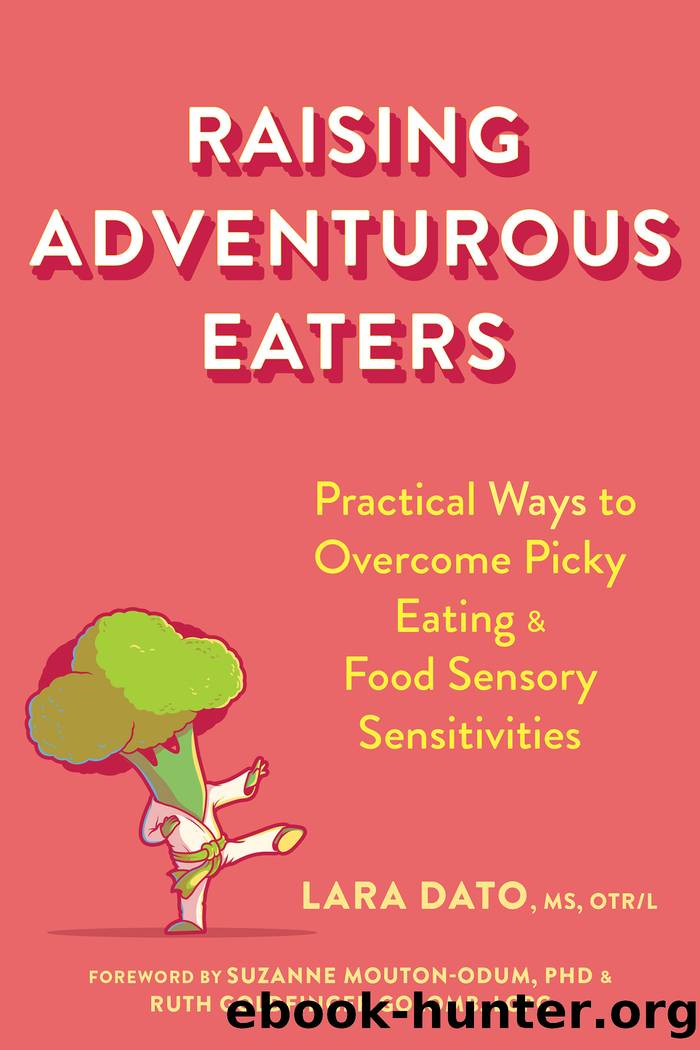Raising Adventurous Eaters by Lara Dato

Author:Lara Dato
Language: eng
Format: epub
Publisher: New Harbinger Publications
Published: 2022-10-21T20:34:36+00:00
21
Mealtime Misbehaviors
Itâs important to remember that children typically misbehave for a reason. Children are learning and testing boundaries; itâs a really important milestone for them to hit. That being said, it can be frustrating when children choose mealtimes (which can already be chaotic) as a time to test those limits. But by identifying the reason behind it, we can help prevent it and know how to deal with it more effectively when it does happen.
Many misbehaviors center around movement and the use of our proprioceptive system, like throwing food, getting up from the table, wiggling around in chairs, and more. Most children are frequently on the moveâeven more so for âsensory seekersâ or children that enjoy a higher amount of proprioceptive input. When children arenât getting their sensory needs met, they can show that by trying to fulfill them themselves, by moving around in a way that feels good or by acting out in other ways to communicate their feelings of dysregulation.
With the strategies in this chapter, youâll feel more confident in staying calm through these trying moments and in preventing, managing, and correcting your childâs difficult behaviors.
The first step is to think a bit about why your child is acting out. Children can have tricky behaviors around mealtime for all sorts of reasons. It may be that theyâre tired from their day and are acting out because of fatigue, or it could be that they just think itâs fun to press your buttons and test those limits. Toddlers are famous for acting out because theyâre learning about cause and effect, or in other words, If I do this, how will my parents react?
But one of the most common reasons that kids misbehave is because theyâre anxious, dysregulated, or trying to distract from the expectations being placed on them. It feels easier to do something naughty or distracting, shifting your focus onto their behavior rather than on what food they may not be eating.
Feeling pressured to eat a new food is stressful! It can be almost impossible to take that pressure off our kids, as many of them put it on themselves, and as loving parents, we worry so much about if our children are getting enough to eat. That worry and love creates a cycle of expectation and pressure on our kids. Understanding why your child is acting out can help you approach the behavior from a place of compassion, which is key to your success. If you get angry or frustrated, the situation will escalate and get worse, but if you can stay calm and compassionate, youâll be better prepared to diffuse the situation and end their negative behaviors.
In this chapter, Iâll go through some of the most common misbehaviors that I see and some ways to combat them. With all the strategies I share, remember that it can take two to four weeks to see an effect, so donât give up if it doesnât work the very first time. Itâs important to stay consistent once you choose a strategy to try.
Download
This site does not store any files on its server. We only index and link to content provided by other sites. Please contact the content providers to delete copyright contents if any and email us, we'll remove relevant links or contents immediately.
Through Windows of Opportunity : A Neuroaffective Approach to Child Psychotherapy by Marianne Bentzen; Susan Hart(941)
Overcoming ADHD Without Medication : A Guidebook for Parents and Teachers by Children and Natural Psychology Association for Youth; Children The Association for Youth(879)
Out of the Mainstream: Helping the Children of Parents with a Mental Illness by Loshak Rosemary;(874)
Delphi Collected Works of Sigmund Freud (Illustrated) by Sigmund Freud(633)
The Noom Mindset by Noom(584)
The 48 Laws of Mental Power: Overcoming Trauma and Building Mental Strength by Victor O. Carl(546)
The Psychology of Media and Politics by George Comstock & Erica Scharrer(474)
Sigmund Freud by Janet Sayers;(470)
MANIPULATION & MIND CONTROL: The Persuasion Collection: Dark Psychology Secrets, Analyze & Influence People with Nlp. How to learn Reading Friends and Develop Body Language Skills. by ROBERT TOWER(456)
It's nobody's fault: new hope and help for difficult children and their parents by Harold Koplewicz(433)
Behold the Monster by Jillian Lauren(433)
Totem and Taboo: Some Points of Agreement between the Mental Lives of Savages and Neurotics by Sigmund Freud(420)
The Hypnotic Coach: A Conversational Hypnotherapy Tool Kit by Marion Jess(417)
Directions in Technical Writing and Communication by Gould Jay R.;(407)
Mastering Flow: Perform Better, Experience More Joy, and Live a Happier Life by Nils Salzgeber(391)
THE PSYCHOLOGY OF ENTREPRENEURSHIP; New Perspectives by Michael M. Gielnik; Melissa S. Cardon; Michael Frese(381)
Mind Hacking Secrets and Unlimited Memory Power: 2 Books in 1: Learn How to Improve Your Memory & Develop Fast, Clear Thinking in 2 Weeks + 42 Brain Training Techniques & Memory Improvement Exercises by Sharp Scott(355)
Positive Psychology Across the Lifespan; An Existential Perspective by Piers Worth(350)
The Modern Young Man's Guide to Manhood by Wayne Walker(340)
